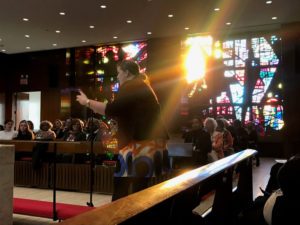This is roughly the sermon preached by the Rev. Meredith Harber during the Lutheran-led worship for the 61st session of the U.N. Commission on the Status of Women Ecumenical Women’s worship on March 14, 2017. Since sermons are lived experiences where the Holy Spirit shows up in her glorious and gracious way, these words aren’t verbatim. This sermon is based on Esther 4:16.
When I was 22 years old, I worked for an elementary school. One of my kids from the school invited me to come have dinner with her family. While her mother was working in the kitchen to finish dinner, I sat with my student’s grandma. In our general introductions, grandma learned my name and then asked me if I had a husband. I generally use humor in these situations, so I said, “No, no. Husbands are a LOT of work and I don’t want to deal with that!” She laughed and agreed, but she persisted. “Why don’t you have a husband?” she asked, with concern painted across her face. I said, “Well, I’m young and I don’t want to rush into anything.” She said, “Yes, you’re young, but you’re fat. And no man is going to want a fat wife. And really, you’re not that young.”
This moment has stuck with me over the last eight years, because this moment captured a feeling that I and many other women experience on a regular basis. My identity was attached to a husband – or my lack of a husband – and to my age and to my weight and to any other outside factor. Anyone else ever have that experience of being reduced to labels and property, rather than to be seen for your whole personhood?
This morning, we heard a bit of the story from Esther, specifically Esther 4:16 that says, “Go, gather together all the Jews who are in Susa, and fast for me. Do not eat or drink for three days, night or day. I and my attendants will fast as you do. When this is done, I will go to the king, even though it is against the law. And if I perish, I perish.” If you haven’t spent time with Esther, I invite you to do so, because she is a fierce woman. This one verse may not seem like much, but this one verse is the turning point in Esther’s story from powerless to powerful.
See, Esther was as powerless as she could possibly be. She was born a girl, to parents who both died in her childhood, leaving her as an orphan. When her uncle, Mordechai, adopted her, she became a tool for him to accomplish his political goals. She was also prejudiced against for her religion and culture as a Jew. King Ahasuerus, the ruler of the land, put out a call for the prettiest virgins to come present themselves to be considered for the king’s harem. Mordechai sent Esther to be reviewed for her beauty and virginity, and she was eventually chosen. She was sent by a man to be chosen by a man to be a sex slave.
Esther was labeled as property by the men in her life. Girl, orphan, Jew, sex slave. She was as powerless as she could be.
But see, Esther wasn’t just someone’s ward or someone’s sex toy. Esther was someone. She worked her way up through the harem, building relationships with those in power, to become the queen of the whole land. She was always powerful, despite the labels placed on her that tried to tell the world – and Esther – that she was worthless.
She was God’s someone.
The beauty of Esther’s story is that while she had harsh words from those around her about who she was and was not, the ultimate word from our God is that we are God’s someone.
YOU, dear friends, are God’s someones.
YOU are powerful beyond belief.
YOU, whether you’re …
old
young
skinny
fat
unmarried
divorced
widowed
married to your husband or wife or partner
a mother
an auntie
a stepmother
painfully childless
happily childless
YOU, no matter your …
race
socio-economic status
religion or denomination
gender identity
assigned place in society
YOU, dear friends, are God’s someones. And YOU, as God’s someones, are powerful beyond belief. Thanks be to God. Amen.
